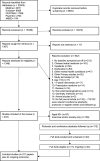Understanding the research landscape of over-the-counter herbal products, dietary supplements, and medications evaluated for depressive symptoms in adults: a scoping review
- PMID: 40735481
- PMCID: PMC12303899
- DOI: 10.3389/fphar.2025.1609605
Understanding the research landscape of over-the-counter herbal products, dietary supplements, and medications evaluated for depressive symptoms in adults: a scoping review
Abstract
Background: Over-the-counter (OTC) products such as herbal medical products (HMPs) or dietary supplements are a valued part of preventative and supportive self-care for depressive symptoms, but there is a wide array of products available, with differing levels of clinical evidence. It is unclear what the optimal directions for future research in this field are.
Aim: We aimed to explore the size and nature of the evidence base available for OTC products for depression in adults aged 18-60.
Methods: We carried out a scoping review following Joanna Briggs Institute guidance. We searched MEDLINE, Embase, PsycINFO, AMED, and CENTRAL from inception to December 2022, and 10% of the results were screened by two authors and the remainder by one author. We included randomised controlled trials of products commonly available OTC in multiple countries in participants with symptoms or a diagnosis of depression. Results were narratively summarised by the product and volume of evidence available.
Results: Out of 23,933 records found, we screened 1,367 full texts and included 209 trials. The largest volume of evidence was for omega-3s, St John's Wort, saffron, probiotics, and vitamin D. Among a range of herbal medical products with promising evidence, those most commonly used and thus warranting further research were lavender, lemon balm, chamomile, and Echium. For 41 products, we found only single trials. Few products presented safety issues, whether used alone or adjunctively with antidepressants.
Conclusion: Products with limited but promising evidence included folic acid, lavender, zinc, tryptophan, Rhodiola, and lemon balm, and future research should focus on these products. There is a need for further evaluation of herbal medical products as adjuncts to antidepressants and for exploring their potential benefits when used adjunctively with psychological therapies to support a more integrative approach. Safety reporting in these trials needs to be further improved.
Systematic review registration: https://osf.io/rkm57/.
Keywords: depression; dietary (food) supplements; herbal medicine; major depressive disorder; scoping review.
Copyright © 2025 Frost, Zamri, Mathew, Salame, Bhanu, Bhamra, Bazo-Alvarez, Heinrich and Walters.
Conflict of interest statement
The authors declare that the research was conducted in the absence of any commercial or financial relationships that could be construed as a potential conflict of interest. The author(s) declared that they were an editorial board member of Frontiers, at the time of submission. This had no impact on the peer review process and the final decision.
Similar articles
-
Antidepressants for pain management in adults with chronic pain: a network meta-analysis.Health Technol Assess. 2024 Oct;28(62):1-155. doi: 10.3310/MKRT2948. Health Technol Assess. 2024. PMID: 39367772 Free PMC article.
-
Herbal and dietary therapies for primary and secondary dysmenorrhoea.Cochrane Database Syst Rev. 2001;(3):CD002124. doi: 10.1002/14651858.CD002124. Cochrane Database Syst Rev. 2001. Update in: Cochrane Database Syst Rev. 2016 Mar 22;3:CD002124. doi: 10.1002/14651858.CD002124.pub2. PMID: 11687013 Updated.
-
Psychological therapies for treatment-resistant depression in adults.Cochrane Database Syst Rev. 2018 May 14;5(5):CD010558. doi: 10.1002/14651858.CD010558.pub2. Cochrane Database Syst Rev. 2018. PMID: 29761488 Free PMC article.
-
Oral nutritional interventions in frail older people who are malnourished or at risk of malnutrition: a systematic review.Health Technol Assess. 2022 Dec;26(51):1-112. doi: 10.3310/CCQF1608. Health Technol Assess. 2022. PMID: 36541454 Free PMC article.
-
Dietary interventions for recurrent abdominal pain in childhood.Cochrane Database Syst Rev. 2017 Mar 23;3(3):CD010972. doi: 10.1002/14651858.CD010972.pub2. Cochrane Database Syst Rev. 2017. PMID: 28334433 Free PMC article.
References
-
- Abedimanesh N., Ostadrahimi A., Bathaie S. Z., Abedimanesh S., Motlagh B., Asghari J. M., et al. (2017). Effects of saffron aqueous extract and its main constituent, crocin, on health-Related quality of life, depression, and sexual Desire in coronary Artery disease patients: a double-blind, placebo-controlled, randomized clinical trial. Iran. Red. Crescent Med. J. 19. 10.5812/ircmj.13676 - DOI
-
- Akhondzadeh B. A., Ghoreishi S., Noorbala A., Akhondzadeh S., Rezazadeh S. (2008). Petal and stigma of crocus sativus l. in the treatment of depression: a pilot double - blind randomized trial. J. Med. Plants 7. 10.1016/j.pnpbp.2006.11.010 - DOI
Publication types
LinkOut - more resources
Full Text Sources


